
Now we’re getting more into the actual, physical forms of abuse that are not just tropes in fiction. This is physical abuse – pulling hair, punching, slapping, kicking, biting, anything that brings harm to your body. Damaging your property out of anger. Forcing you to use drugs or alcohol was a really weird one in Hana Yori Dango because he kidnaps her, drugs her, and she wakes up to being given a makeover, and that’s like, “Oh, he just doesn’t understand how to be nice to her, that’s why he did that. He was just trying to be nice!” He drugged her. He drugged her. The property tends to involve phones, because that is an avenue of communication with other people. If they’re communicating with other people, the guy will destroy the phone in a temper tantrum.
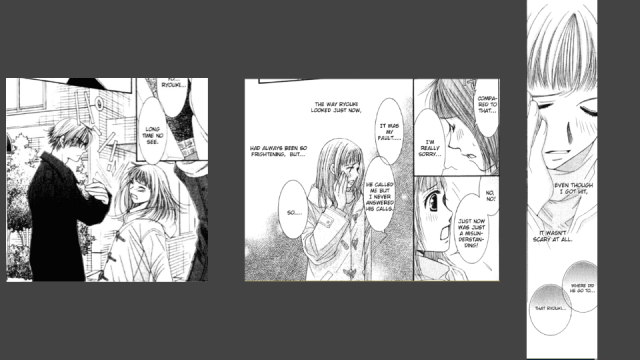
This is a scene from Hot Gimmick where Hatsumi was out with her brother and therefore not picking up her phone, while Ryouki was trying to call her. The next time he sees her, he walks up to her and slaps her hard across the face. Of course everyone’s like, “Oh my god! How could you do that! How dare you?” But she just says, “Oh no, it was my fault. I’m not mad.” She says, “Even though I got hit, it wasn’t scary at all.” The narrative never really shows, no, he was being a jerk for slapping her. That never comes across. Everyone else is angry, but Hatsumi is not angry, and that’s what matters. Her reaction of, “It was my fault,” is a very standard sign of abuse. Abuse victims tend to blame themselves for what happens to them – they didn’t do things right, therefore they brought it on themselves.
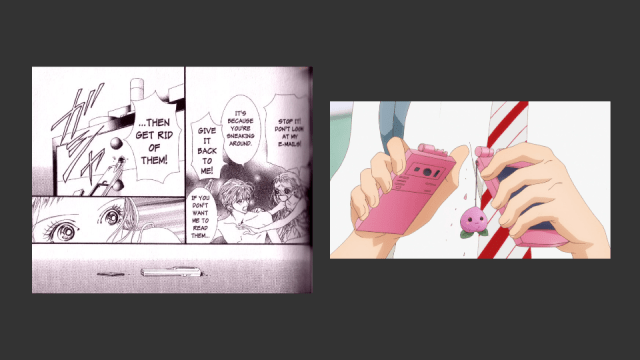
Here we have the phone breaking scenes. In Wolf Girl and Black Prince, they weren’t even dating. She was being his dog. But she’s texting with this other guy, and he’s like, “Can I see your phone?” And he snaps it in half, once again, destroying her ability to communicate with other people. In Paradise Kiss, Miwako got up for some reason, she comes back and sees Arashi going through her phone and looking at her messages. She’s like, “No stop! What are you doing?” He throws her phone against the wall and it breaks. This is also a form of emotional abuse – an invasion of her privacy. You have a right to text whoever you want without someone looking through your phone. Out of jealousy, he invaded that privacy, even though they’ve been in a relationship for years, he should trust her, but he knew that they were rekindling this friendship, so the moment that he had the opportunity, he started looking through her emails.
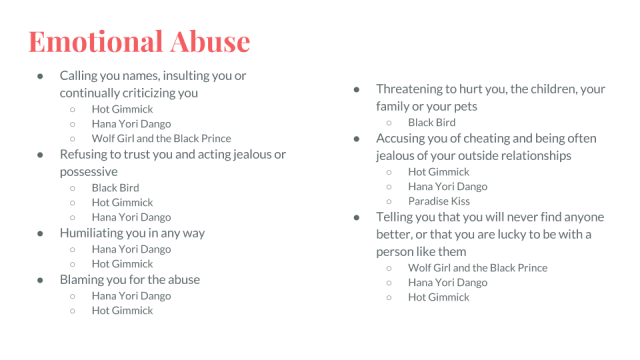
Emotional abuse is a very common one. It’s also one of the most common forms of abuse in real life, because a lot of people don’t recognize the signs. They think, “He’s not hitting me, therefore it’s not abusive.” Forms of emotional abuse involve calling you names, insulting you, or constantly criticizing you; this is all a constant theme in most of these series, especially Hot Gimmick, Hana Yori Dango, and Wolf Girl and the Black Prince. The guys almost never say anything nice to the girl. If they do, it’s a very backhanded compliment, like, “I won’t slap your face because that’s the only part of you that’s worthwhile.” Refusing to trust you and acting jealous or possessive – I put down Black Bird, Hot Gimmick, and Hana Yori Dango, but that’s also in Paradise Kiss, which I just discussed. Humiliating you in any way – Hana Yori Dango and Hot Gimmick have a lot of public humiliation. For example, Ryouki forces Hatsumi to kiss him in the train station, and it’s her first kiss, and kissing in public is a major social taboo in Japan. Blaming you for the abuse – “It’s your fault. If you weren’t so stupid, I wouldn’t have to do this to you.” Threatening to hurt you, your children, your family, or your pets – I saw that mostly in Black Bird.
Accusing you of cheating and being jealous of your outside relationships – in Hot Gimmick, Ryouki is jealous of her brother. Of course this is because it’s a soap opera and he’s her adopted brother and of course he’s actually in love with her… [heavy sigh] [audience laughter] But he’s still her brother.
An interesting one is telling you that you will never find anyone better or that you’re lucky to be with a person like them. You do see this fairly frequently, but you see it mostly coming from people outside the relationship. There’s a lot of scenes where they’ll be walking down the street, and people will see them and be like, “That guy is so hot! Oh my god, can you believe him? Who’s that girl with him? She can’t be his girlfriend. Is he a model? She’s a little young to be his agent, but that must be it, right?”

Here we have a scene from Wolf Girl and the Black Prince where she fell down and got hurt, that happens. He tells her, “A scar on a woman reduces her value and yours was low already.” Everyone has value. No one has low value. Except in this case, maybe Kyoya has low value because he’s talking to her like that. He’s also treating her like the only part of her that’s worthwhile is her appearance, is her body – that’s the only source of a woman’s value.

Here we have a scene in Hana Yori Dango where Tsukushi was out seeing some friends from middle school because she has almost no friends at her school, so of course she wants to see her friends from middle school. They’re male friends, so Doumyouji follows her and he attacks her friends. He almost breaks one of their necks – he has to go to the hospital. When she says, “What are you doing? Why are you attacking them?” he screams at her, he puts her down for being poor while he is wealthy, and lords his higher social status over her, slams her against a wall, and calls her a slut for going out with her male friends, assuming that since she was with her male friends, it was about showing off how popular she was with the guys when she really just wanted to have fun with her old friends and catch up. These are verbal abuse, emotional abuse, physical abuse – it’s hitting every form of abuse! Then after this, he tries to get her kicked out of their school. They end up having to play a three-on-three basketball game and if he wins, she gets kicked out along with her other friend, and if she wins, she can stay, which is the kind of storytelling you’re dealing with in this series. [audience laughter]
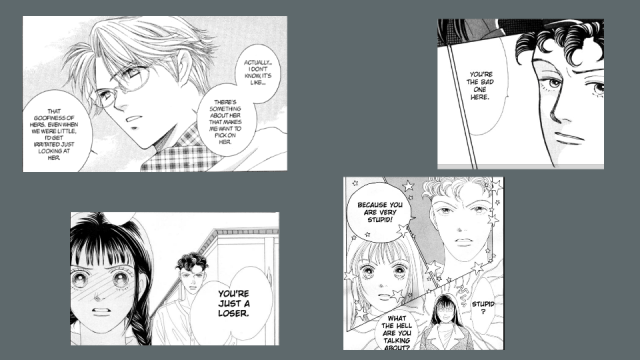
Then we also have other scenes from Hana Yori Dango and Hot Gimmick of verbal abuse. He calls her stupid. At one point he attacks her and blames her – “You’re the bad one here.” He’s attacking her, and he tells her it’s her fault. He calls her a loser. We have Ryouki from Hot Gimmick saying, “Something about her makes me want to pick on her.” That is blaming her for her abuse.
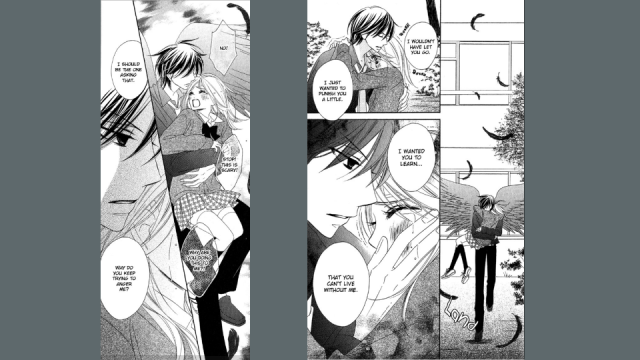
This is a scene from Black Bird where she is talking to another guy. He turns out to be a demon, of course, because every guy who would want to talk to her except for him is a demon, so he grabs her, he flies high over the city, and she freaks out understandably because she is several hundred feet in the air. If he drops her, she’ll die. She’s like, “What are you doing, why are you doing this?” and he’s like, “I should be asking you that. Why are you trying to make me angry?” When he lands, he’s like, “Don’t worry, I wasn’t actually going to hurt you. I just wanted you to learn you can’t live without me,” which is one way that abusers keep their victims in line is they create a sense of dependence. Usually, the victims are not depending on the guy to not drop them from hundreds of feet up, but it’s still the same principle.

Sexual abuse: forcing or manipulating you into having sex or performing sexual acts. Paradise Kiss here, it turned out that Arashi, when he and their friend were fighting over Miwako, the way that he got her for his own was he raped her. Since he raped her, she was his, and she continued to date him. And he’s the one who’s tormented about it! The scene where that’s revealed is treated as something he needs to heal from because he’s so traumatized from it. Another interesting thing in it is, “You blame yourself for turning her into a sexual being.” Women do not become sexual beings the moment they are penetrated. Women are sexual beings well before that, usually, and having sex doesn’t turn them into a sexual being. It’s really messed up!
In Hana Yori Dango Doumyouji almost rapes Tsukushi. He tries to rape her and almost succeeds until he changes his mind on multiple occasions.
Ignoring your feelings regarding sex happens a lot in Hot Gimmick and Black Bird. In Hot Gimmick it’s sort of treated, once again, as social awkwardness. He doesn’t understand what consent looks like: “She’s his slave. If she resists she’s just doing what she has to do; she’ll stop resisting if he keeps going.” She might, but that doesn’t mean she’s consenting.
Reacting negatively with sadness, anger, or resentment if you say no or don’t immediately agree to something – Hot Gimmick and Paradise Kiss, Ryouki throws quite a few tantrums over it. In Paradise Kiss there’s a couple scenes where Miwako’s like, “Oh, you can’t come over tonight because my sister’s there,” and he’s like, “Well, guess I’ll just go home then!” and sulks off.
Continuing to pressure you after you say no, trying to normalize their sexual expectations like, “I do this just because I’m a guy, all guys are like this.” No, not all guys are like this. A decent guy will treat a woman with respect and not touch her whenever he feels like it because he thinks he owns her body.
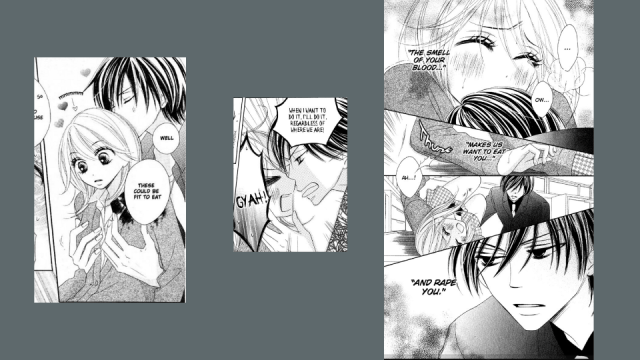
These are various parts of Black Bird where Kyo treats her like a sexual object for his entertainment, with a bonus of, “I could rape you… I always want to rape you. The smell of your blood makes us want to rape you.” So anytime she bleeds, and she bleeds a lot… she bleeds a lot because she’s always getting attacked, there’s this sense that he has to hold himself back from attacking her.

Here’s a scene in Hot Gimmick where Ryouki invites Hatsumi over… well, he doesn’t invite her over. He summons her to his apartment. She comes over and he immediately tackles her onto the bed because his tutor is coming over and he wants to look sexually experienced for his tutor. He wants to use Hatsumi as sex practice. When she freaks out, he starts looking at a magazine like, “She says no but she really means yes, so just keep going!” This magazine has taught him that girls will try to play hard-to-get so just keep going. He also says, “You bought a pregnancy test, so that means you’ve had sex. Of course you would want to have sex with me.

At one point he finds her drugged on a staircase and takes that as an invitation to kiss her neck and her chest and grab her breasts. As you can see from the text here, she’s barely conscious, and she comes to with his hands on her. At one point another tenant walks by and sees this guy grabbing onto a barely conscious girl and is like, “Sorry to interrupt! Bye! Carry on!” Which also invites the assumption, if you see something going on, it’s not your problem. If you see something, say something. Say, “Hey, get away from her,” you know? Help each other out.

Here we have a scene from Hana Yori Dango. These two pages are right next to each other. One is a violent rape, where she’s resisting, she’s freaking out. The next one has all the soft-focus screentone work focusing on him kissing her neck sensuously [sic]. It looks like a romantic sex scene. Just after this panel, he changes his mind, pats her on the head gently, and says, “Don’t cry.” Tsukushi’s not like, “Holy sh-” I’m not supposed to curse, this is PG-13… “Oh my god! I almost got raped!” she’s thinking, “He patted me on the head so gently and said, ‘Don’t cry…’” [uncomfortable laughter from audience] “Oh… doki doki…” [audience laughter]
Next: Conclusions

I am anxiously awaiting your summary of this! I married a traditional man whom I met at 16 in 1980 (52 yeah old I know) and all told I lived my life in the culture for 21 years. I can tell you that what you are finding about abusive tendencies is not random at all . . .especially the manner. And what if incest and pedophilia? I’m not anti anime. There is a ton of good stuff, but viewers need to understand the nature of the Japanese character is not all polite and ritualistic. I have a few posts that touch upon these things. Thank you for doing the research!
LikeLike
I hate to be that guy, but once again, a lot of the stuff listed here was present in Diabolik Lovers, yet a lot of people romanticize it. I regret purchasing Black Bird. Should I burn or just sell both volumes I own?
LikeLike
That was very interesting to read! I like reading shoujo mangas but when I see these kinds of abuses, I feel very annoyed as how banal they make it seem… I’m a big fan of japanese culture but all these machist ideas like “women should just endure the pain because men want to do whatever they want… And it’ so romantic~~” just ticks me off! And a lot of people think it’s normal, it’s so enraging!
Anyways, thank you very much for posting this!
(sorry if there are mistakes, I’m a foreigner)
LikeLike
Pingback: Romance and Abuse in Shoujo Manga Part 4 – Conclusion – I Have a Heroine Problem
Pingback: Heroine Problem at the Conventions, 2017 Edition – I Have a Heroine Problem
Hi ! I read your four parts and I agree with you, but I don’t think paradise kiss and hyd are the best examples out there (since they tend to denounce abuse, not normalise it, even if they have huge flaws), a lot of shoujos are scarrier, and way worse (the film/manga/cellphone book koizora might be the most shocking strory ever). As for the age gap it is indeed weird (for sailor Moon defence they were destined to be together since they are reincarnations, which makes it more acceptable).
LikeLike
Thanks for reading and your input.
I stand by my choice to include HYD and ParaKiss. They both talk out of both sides of their mouths when it comes to abuse, at once denouncing it and making excuses for it. Yes, Tsukushi fights back against Doumyouji, but she still dates him. He never changes his ways meaningfully, with violent episodes right up to the end of the manga, and she marries him in the end even as he controls her and verbally abuses her. You say there are scarier shoujo manga, but I can’t think of any anime or manga that upset me as viscerally as the attempted rape scene early in the series. However, since he changed his mind and stopped, Tsukushi focuses on the way he kisses her and tells her not to cry. Kamio has the nerve to call him “gentle”!
Paradise Kiss is a more complicated case. Yazawa is an excellent writer and artist and I love her work for the most part. However, the way it uses rape doesn’t sit well with me because it’s a source of angst for the rapist, with no interest in Miwako’s feelings on the matter. I’ve decided to remove it from my latest draft of the presentation, because josei tends to have more nuanced depictions of relationships, but I do not think ParaKiss denounces it very strongly at all.
LikeLike
Ok, I see what you mean : I also found the attempted rape scene very shocking. Though, since all of the abuse happening in Eitoku Gakuen was an exaggeration of what ijime could be, I didn’t see it through this light. W Doumyouji remains a psycho from the beginning to the end of the story
LikeLike
I’m sorry I posted by error before I finished writing : what I wanted to tell was the attempted rape appeared (to me) as some sort of harassment in the middle of all the other harassment.
I didn’t think the way women were treated was the most disturbing thing in HYD. I found the way the harassers got away with their crimes more annoying, and revoting. But as you emphasized the fact that she found him “gentle”, I totally get why you found it awful. So, I got to re-read the entire series, to see it through a new spotlight.
As for Paradise Kiss, I personally found interesting that the rape caused damage to the rapist himself (and yes, there is probably a lack of interest showed toward Miwako in this case, but I also liked that the manga didn’t fit my expectations on “how rape should be dealt with”).
If you were to write an article about abuse in josei, I would really enjoy to read it ^^! (if that’s not already the case)
LikeLike